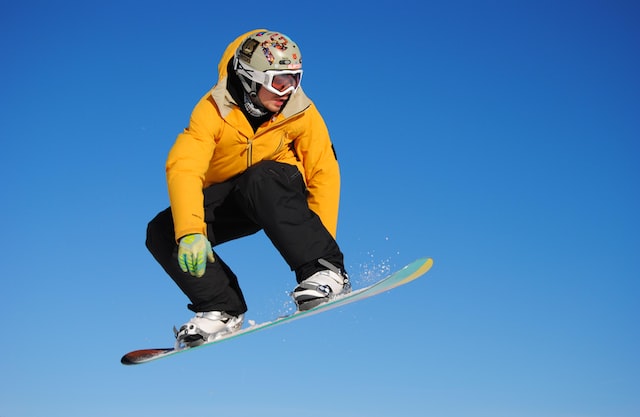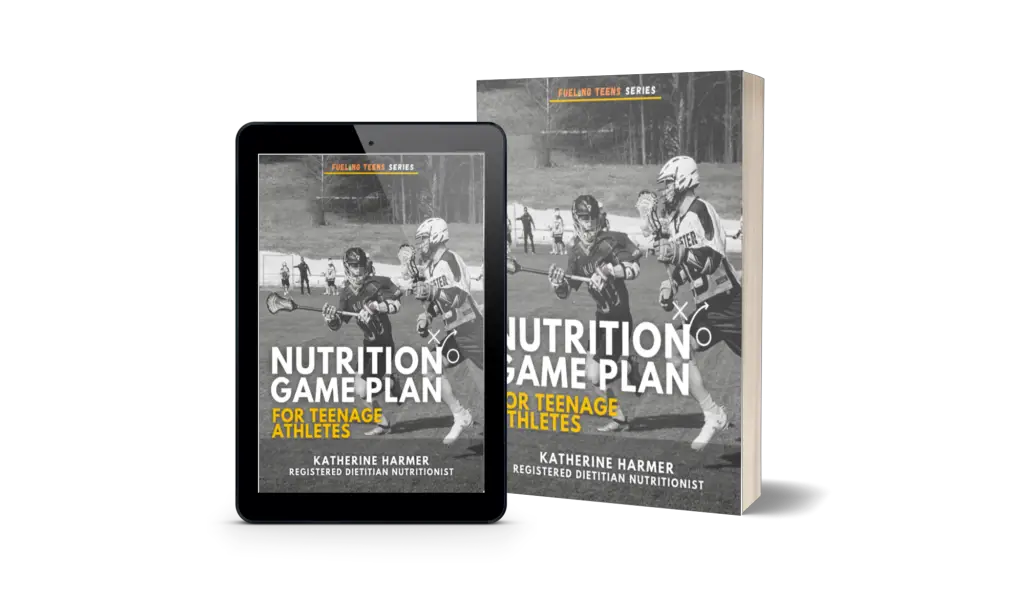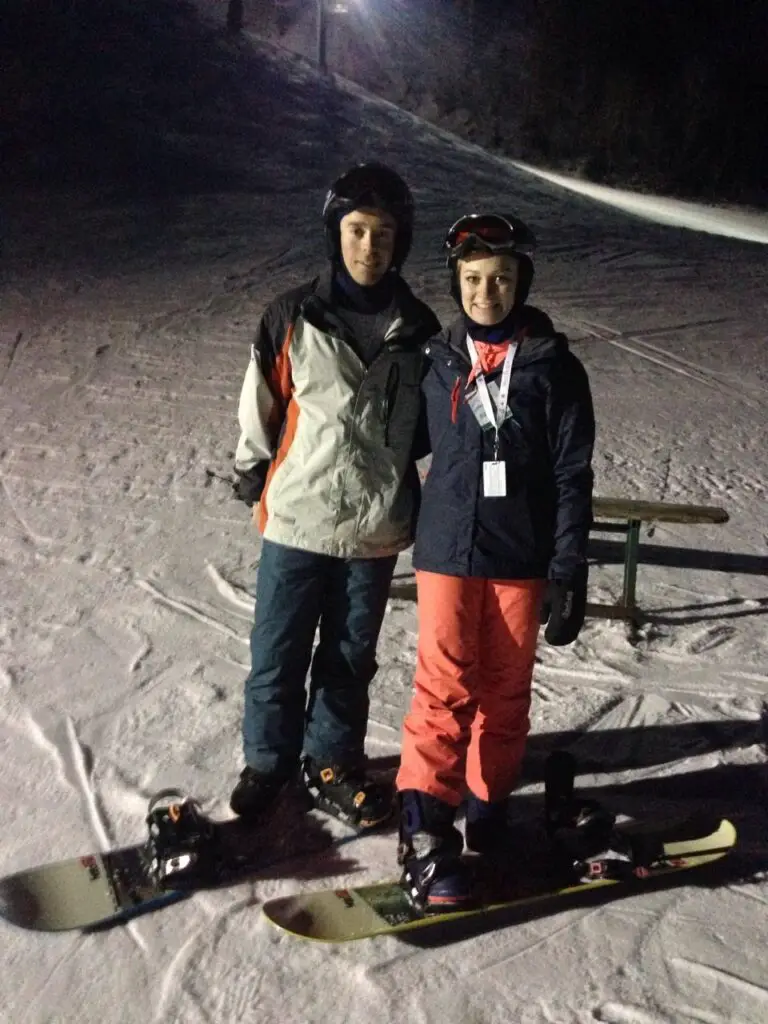Teenage athletes must learn how to properly fuel their bodies if they want to perform at their peak level. This includes knowing how much to eat, and when to eat certain foods. If you understand the basics of sports nutrition, you won’t have to cut any foods out of your diet because you will understand how all foods fit in!
Teenager snowboarders should focus on consuming adequate calories for the activity that they are doing by developing a good relationship with their body and listening to hunger and fullness cues. Snowboarders should eat a balanced diet with lots of variety from all of the food groups and include plenty of fruits, vegetables, whole grains, low-fat dairy, lean protein, and healthy fats! Athletes should be sure to get a good balance of carbohydrates, protein, and fat throughout their day as well!
Snowboarders should keep snacks in their pocket or backpacks to eat during long days on the slopes. Dried fruit, jerky, fruit leather, protein bars, granola bars, and candy are great choices for lasting energy and fuel.
Read on for more information about calorie needs and important nutrients for snowboarders, what to eat before, during, and after an event or practice, what to eat on rest days, and hydration needs!

How Many Calories Does a Teenage Snowboarder Need?
Calorie needs vary greatly sport-to-sport and athlete to athlete. Plus, athletes know that not every day of training or competing looks the same- some days you just expend more energy than others and therefore the amount of calories your body needs changes day-to-day. If you are trying to get a general idea for how many calories your body needs, check out the chart below, focusing on the section for active teenagers:
If you read the description of the activity levels, however, the “active” category includes anyone doing more than 40 minutes of physical activity in a day. If you spend a full day snowboarding, your calorie needs could be much higher than what is shown on these tables.
Since calorie needs can change so much day-to-day, it is most helpful to eat frequent, substantial meals and snacks throughout the day and honor your body’s needs as you go. That means if you are still hungry, eat more! If you are less hungry one day because you haven’t been as active, you can make adjustments for that too!
See also: How Many Calories Should a Teenage Athlete Eat? Ask A Dietitian
Looking for a meal plan for snowboarders? Need specific personalized help from a Registered Dietitian Nutritionist? Check out my Teen Athlete Meal Plan eBook with nutrition tips to get you from off-season to competition day! Or even if you don’t snowboard competitively, you’ll still find the nutrition tips helpful.

See also: Best Meal Plan for Teenage Athletes (FREE Download)
Important Nutrients for Snowboarders
Carbohydrates, protein, and fat are known as macronutrients- meaning we consume them in larger amounts and they all provide calories for your body. Eating them in balance and at the right times (before vs. after exercise) can make a huge difference in how you feel, how well you perform, and your ability to recover. Micronutrients are vitamins and minerals that we consume in smaller amounts, but there are tons of them that do so many amazing things for your body.
Carbohydrates
Carbs are your body’s preferred source of energy, which means athletes typically need a higher percentage of their calories coming from carbs than the average person. Your carbohydrate needs will be higher on a high activity day when you are expending a lot of energy on the slopes.
Most of your carbohydrates should come from fruit, whole grains, starchy vegetables, and low-fat dairy but sports drinks, juice, candy, and other foods like that definitely can have a place in a healthy diet!
Protein
Protein is important for building muscle and reducing soreness, which is so important for snowboarders who are pushing their muscles to the limit. Research has found that spreading out your protein intake throughout the day is extremely important for maximizing its benefit. I typically recommend athletes getting between 20-30 grams of protein at meals and 10-30 grams at snacks.
Protein is found in meat, fish, poultry, nuts, nut butter, seeds, eggs, milk, greek yogurt, cheese, soy milk, tofu, edamame, lentils, and beans. It is a good idea to choose leaner protein foods, and include a mix of both animal and plant-based protein sources.
Fat
There are different kinds of fats, all of which can be part of a healthy diet, but it is important to focus on healthy fats like seeds, nuts, nut butters, avocado, oils, fish, etc. Healthy fats can help reduce inflammation, improve cholesterol levels, absorb essential vitamins, regulate blood sugar levels, and more!
Vitamins and Minerals
The best way to make sure you are meeting your vitamin and mineral needs is to eat a variety of foods from each food group. Each food has a unique nutrient profile, so getting as much variety as possible is always going to be beneficial!
Sometimes personal preference, allergies, intolerances, and other medical conditions can impact what foods someone is able to consume, or how your body absorbs nutrients. A vitamin and mineral supplement might be helpful for some people. Always talk to your doctor before starting any kind of supplement!
What Should a Snowboarder Eat Before Snowboarding or Competing?
As a general rule of thumb, athletes should focus on carbohydrates the closer they get to exercising. If you are eating 3-4 hours before exercise, you will probably be fine to include good sources of healthy fats and protein since you will have plenty of time for your food to digest. However, if you are eating half an hour before exercising, you might need to eat a smaller quantity that is higher in carbohydrates, moderate in protein, and low in fat.
Remember that carbohydrates are your body’s main source of energy and they typically break down pretty quickly if you aren’t eating a lot of fat, protein, and fiber with it. Liquid protein like milk or a smoothie made with greek yogurt is a little bit easier to digest- especially if you have a sensitive stomach. What works well for a lot of athletes is eating a more balanced meal a few hours before your workout followed up by a high carb snack 30-60 minutes beforehand.
High carbohydrate snacks that are easy to digest include things like:
- Banana or other fresh fruit
- Applesauce
- Pretzels
- Crackers
- Fruit smoothie
- Cereal
- Chocolate milk
- Fruit leather
- Fruit juice
- Sports drinks
- Fruit snacks
See also: The 25 BEST Pre-Workout Meals and Snacks For a Teenage Athlete and The Worst Foods to Eat Before a Competition
What Should a Snowboarder Eat During an Event?
Generally, if you are exercising for more than an hour and a half, you likely will need to eat or drink something with simple carbohydrates to keep your energy levels stable. Competitions, practice, or just hanging out in the mountains can make for a long exercise bout. If this is the case, try including 30-60 grams of carbohydrates each hour during your exercise.
If you are spending a full day snowboarding, you will want to pair your carbohydrates with some extra protein to help you make it through the full day. Take advantage of longer breaks between runs to eat a meal or more substantial snack.
Some people like to take an occasional snack break, and some boarders take snacks to go in their pockets or backpacks and eat on the lift! The best “lift snacks” include dried fruit, candy bars, granola bars, and protein bars.
See also: What is the Best Drink for Dehydration? and Should Football Players Drink Gatorade?
What Should a Snowboarder Eat After an Event?
After an event, recovery is a top priority. It is really important to get a balanced snack with a focus on carbohydrates and protein soon after you are done exercising. Protein will help with muscle recovery and provide your body with the materials it needs to rebuild and get stronger. It is essential to replenish your carbohydrate stores after using up so much energy during exercise too!
If you don’t feel hungry after exercising, I recommend at least having a small snack or drinking some chocolate milk or juice to start refueling. Eating or drinking something can also help to stimulate your appetite!
See also: The BEST Post-Workout Snacks for Teenagers – Dietitian Recommended!
What Should a Teenage Snowboarder Eat on a Rest Day?
On a rest day, you still need to properly fuel your body. You might even be surprised to find yourself extremely hungry, even when you aren’t doing much physical activity that day. Snowboarders might have a hard time eating enough on a day they are out on the slopes, so they might need to consume more the next day to help their body catch up and recover from the calorie deficit.
Even on rest days, snowboarders should be eating frequent, balanced meals and snacks throughout the day. Most snowboarders will need to be eating at least every 4 hours, on rest days and on active days! Portion sizes can always be adjusted to meet your daily needs, but getting in a pattern of regular meals and snacks helps keep you on top of your fueling so you don’t get behind.
Hydration Needs for Snowboarders
Sometimes it is easier to remember to hydrate when you are exercising in the heat and sweating a lot, but hydration is still super important for winter athletes that are exercising in the cold! The key to staying hydrated as an athlete is to start early and stay on top of it. If you are about to start a run and you realize you haven’t had anything to drink all day- that usually isn’t the best time to start, unless you are okay with taking lots of bathroom breaks during your workout or competition.
An easy way to figure out how much you need to be drinking is to drink 1 mL for every 1 calorie you burn during the day. So if you are burning 3200 calories, you would need about 3200 mL of fluid (3.2 L). This might not meet all of your fluid needs, but some of the foods you eat will also contain water and can help you make up the difference.
Rather than chugging a bunch of water all at once, it is best to sip throughout the day to stay hydrated. During exercise, you may want to also include some electrolytes to improve your hydration and replace what is lost through sweat. Sports drinks like Gatorade and Powerade are a great way to replenish fluids and electrolytes at the same time! (Plus, they provide carbohydrates to keep your energy levels up).

Summary
Snowboarders usually have energy needs that change frequently, which is why it is so important to understand how to fuel your body for what you are doing. This is also why it is so important to develop a good relationship with food and with your body so that you can listen and respond to your body’s cues.
See also: Best Meal Plan for Teenage Athletes (FREE Download) and The Nutrition Tips you Need to Know for Snowboarding
Related Posts
- Nutrition Tips for Football Off-Season
- Can a 15-Year Old Take Protein Shakes?
- The Best Protein Snacks for Teenagers
- Is Whey Protein Safe for Teenage Athletes? Here’s What Dietitians Recommend
- Best Supplements for Teenage Athletes
- See also: Best Meal Plan for Teenage Athletes (FREE Download)
Resources
Ellis E. How Many Calories Does My Teen Need? Eatright.org. Published October 4, 2019.
Fueling Teens is a participant in the Amazon Services LLC Associates Program, an affiliate advertising program designed to provide a means for sites to earn advertising fees by advertising and linking to Amazon.com. We also participate in other affiliate programs which compensate us for referring traffic.
